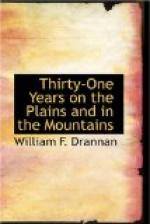So we started for Bent’s Fort accompanied by four young Kiowas. We had loaded our horses unusually heavy this trip, each animal packing thirty robes.
Two of the Indians rode in front of the pack-train with me and the other two behind with Jim. Our idea in traveling that way was that in case we should meet a band of Sioux, these young Indians would tell them we were their friends, and no matter how bitter they felt toward us they would pass on.
We traveled three days before we saw any Sioux. It was our custom to always stop and unpack and let our horses rest and feed about an hour.
That day we had just unpacked and turned our horses loose to feed and were ready to eat a cold lunch, when we looked up the ridge and saw twenty Sioux Indians coming down the ridge in the direction of our camp. I told one of the Indians that we had better go and meet them. He said he would go and for me to stay in camp. I told him to tell them to come down to camp and get something to eat. So he started off in a trot to meet them, and when he came up to them he stood and talked with them for some time, after which they turned and rode off in another direction. When the Indian boy returned I asked him why they did not come down to camp and have some dinner. He said they had plenty to eat and were in a hurry.
Jim Bridger said to me in our own language: “If we had not had those young Kiowas with us by this time we would have been in a hurry, too.” These were the last Sioux we saw on the whole trip.
When we returned to the fort and reported our troubles to Col. Bent and Mr. Roubidoux, they felt very bad over the loss of the Mexican boy, Hasa, but they complimented us on the way we had managed. They asked me what I had agreed to pay the Indians. I told them I had not made any bargain whatever, and that we had not agreed to pay them anything, nor had they asked it. But we thought that under the circumstances we did not consider it safe to attempt to make another trip that fall or winter without an escort of that kind, and we couldn’t expect those Indians to make the trips free of charge. Col. Bent told me to make my own bargain with them, and he would pay the bill whatever it might be.
This was the first time these young Indians had ever been in civilization, so I took them around the place and took particular pains to show them everything. When we had been all around and I had showed them everything out doors, I took them into the kitchen of the hotel. When they saw the cook getting supper on the stove they said it was no good, for they could not see the fire and they did not understand how cooking could he done without it.
After they had seen all there was to be seen I took them in where the two proprietors were, and after telling them that they would hire them all winter, providing they did not ask too much, I asked them what they were going to charge us for the trip they had already made.




